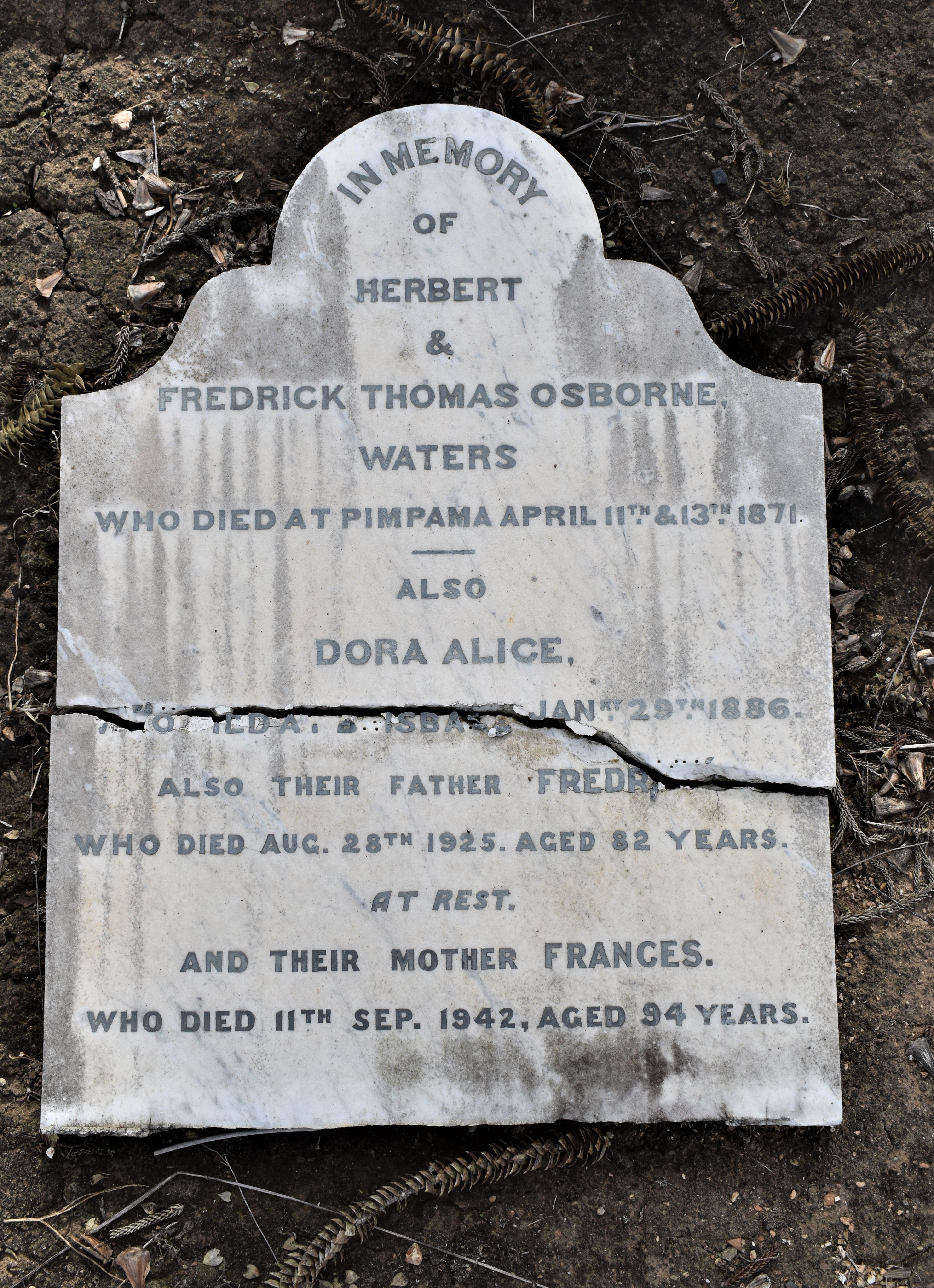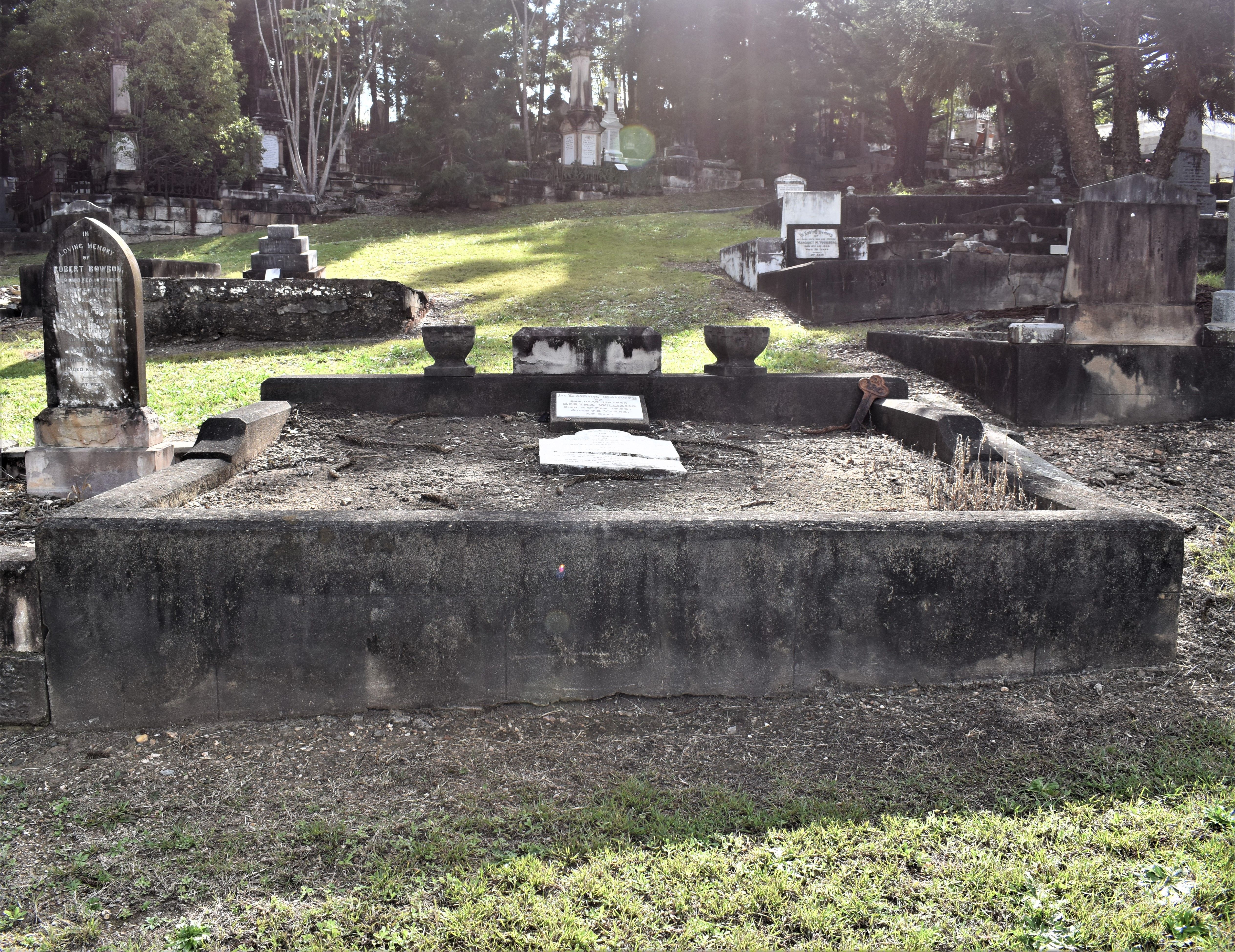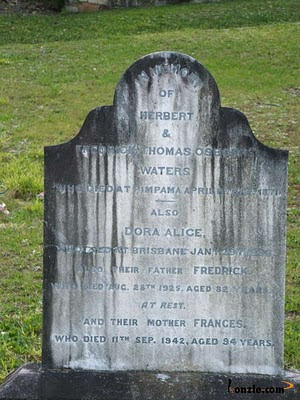Fred and Frances, as industrious in their new location as they had been in London, were soon working at a sugar plantation called Ormeau, south of Brisbane. Tragedy again struck Fred and the young family when their youngest child, Herbert, died on 11th April 1871 from "water on the brain" - what we now know as hydrocephalus. As was necessary, a magistrate was summoned to perform an inquest into the death. This is the report from the Brisbane Courier of 15th April, 1871:
A Magisterial inquiry was held on Thursday, before Mr J. Gibson, at the residence of Mr F. Waters, Pimpama, touching the death of a little child, the son of Mr Waters, who died suddenly two days previously. The evidence was to the effect that the child had died from water on the brain. At the conclusion of the inquiry Mrs Waters intimated to the presiding magistrate that she had another child sick, and she would like him to see it. They adjourned to the adjoining room, and no sooner had the mother entered it than she exclaimed, "The child is dead!" On examination, this was found veritably to be the case, the poor little sufferer, a boy about two years old, having apparently breathed his last about an hour previously. It is almost unnecessary to say that the greatest sympathy is felt for the parents.
The boys were buried together in the Pimpama Church cemetery, although no records exist of interments prior to 1891. Frances later wrote "Father had built a slab coffin and buried the boys embracing each other, next to the creek at Pimpama". There is a memorial to the two lads at the family grave site at Toowong Cemetery.
Shortly after the boys' deaths, Frances, evidently and understandably in a state of depression after losing both her son and her step-son within a couple of days, was "severely reprimanded" by the plantation's owner, a Major Boyd, for her melancholy disposition, as reported to him by Frances' supervisor. Enraged by this, Fred settled the matter with the supervisor using his fists, causing the supervisor to have to "take to his bed for a period of six days" according to the Police Gazette.
Fredrick and his remaining family left the sugar plantation following that incident. The next lead traces them to Brisbane in 1872, where once again, Fred is working as a porter. Now putting their considerable energies to use for themselves, they were able to build several businesses in the Petrie Terrace area of Brisbane. They were fruiterers, furniture manufacturers and dealers, and they also ran a boarding house and a transport business that had grown from Fred's humble hand barrow into several horse-drawn wagons.
hile they were building businesses, Fredrick and Frances were building a family, in all producing thirteen children. The youngest of the children was Anthony's grandfather, Edward Harold Waters, who was born in 1895. Fred Waters established his furniture factory in the back of the old jail on Petrie Terrace. The jail had been vacated on the completion of the new facility at Boggo Rd, and so was being used for other purposes.
However, in those early days, disaster seemed never to be too far away. Fred and Frances also lost a three year-old daughter to typhoid in 1888, as well as another adult daughter who died in childbirth. Then, they had their lives once again turned upside down when the factory and their residence next door to it were completely destroyed by fire in 1899.
Fred and Frances, as industrious in their new location as they had been in London, were soon working at a sugar plantation called Ormeau, south of Brisbane. Tragedy again struck Fred and the young family when their youngest child, Herbert, died on 11th April 1871 from "water on the brain" - what we now know as hydrocephalus. As was necessary, a magistrate was summoned to perform an inquest into the death. This is the report from the Brisbane Courier of 15th April, 1871:
A Magisterial inquiry was held on Thursday, before Mr J. Gibson, at the residence of Mr F. Waters, Pimpama, touching the death of a little child, the son of Mr Waters, who died suddenly two days previously. The evidence was to the effect that the child had died from water on the brain. At the conclusion of the inquiry Mrs Waters intimated to the presiding magistrate that she had another child sick, and she would like him to see it. They adjourned to the adjoining room, and no sooner had the mother entered it than she exclaimed, "The child is dead!" On examination, this was found veritably to be the case, the poor little sufferer, a boy about two years old, having apparently breathed his last about an hour previously. It is almost unnecessary to say that the greatest sympathy is felt for the parents.
The boys were buried together in the Pimpama Church cemetery, although no records exist of interments prior to 1891. Frances later wrote "Father had built a slab coffin and buried the boys embracing each other, next to the creek at Pimpama". There is a memorial to the two lads at the family grave site at Toowong Cemetery.
Shortly after the boys' deaths, Frances, evidently and understandably in a state of depression after losing both her son and her step-son within a couple of days, was "severely reprimanded" by the plantation's owner, a Major Boyd, for her melancholy disposition, as reported to him by Frances' supervisor. Enraged by this, Fred settled the matter with the supervisor using his fists, causing the supervisor to have to "take to his bed for a period of six days" according to the Police Gazette.
Fredrick and his remaining family left the sugar plantation following that incident. The next lead traces them to Brisbane in 1872, where once again, Fred is working as a porter. Now putting their considerable energies to use for themselves, they were able to build several businesses in the Petrie Terrace area of Brisbane. They were fruiterers, furniture manufacturers and dealers, and they also ran a boarding house and a transport business that had grown from Fred's humble hand barrow into several horse-drawn wagons.
hile they were building businesses, Fredrick and Frances were building a family, in all producing thirteen children. The youngest of the children was Anthony's grandfather, Edward Harold Waters, who was born in 1895. Fred Waters established his furniture factory in the back of the old jail on Petrie Terrace. The jail had been vacated on the completion of the new facility at Boggo Rd, and so was being used for other purposes.
However, in those early days, disaster seemed never to be too far away. Fred and Frances also lost a three year-old daughter to typhoid in 1888, as well as another adult daughter who died in childbirth. Then, they had their lives once again turned upside down when the factory and their residence next door to it were completely destroyed by fire in 1899.
Gravesite Details
72y; w/Harry
Family Members
-
Herbert Waters
1870–1871
-
![]()
George Waters
1872–1945
-
Annie Elizabeth Waters Gilchrist
1874–1904
-
![]()
Bertha Waters Williams
1877–1956
-
![]()
Bertha Mary Waters Williams
1877–1956
-
Frederick Amies Waters
1879–1920
-
![]()
Dora Alice Waters
1883–1886
-
Florence May Waters Quaife
1885–1967
-
![]()
Lena Waters Wixon
1887–1988
-
![]()
Thomas Arthur Waters
1891–1944
-
![]()
Edward Harold "Bud" Waters
1895–1968
Sponsored by Ancestry
Advertisement
Advertisement













